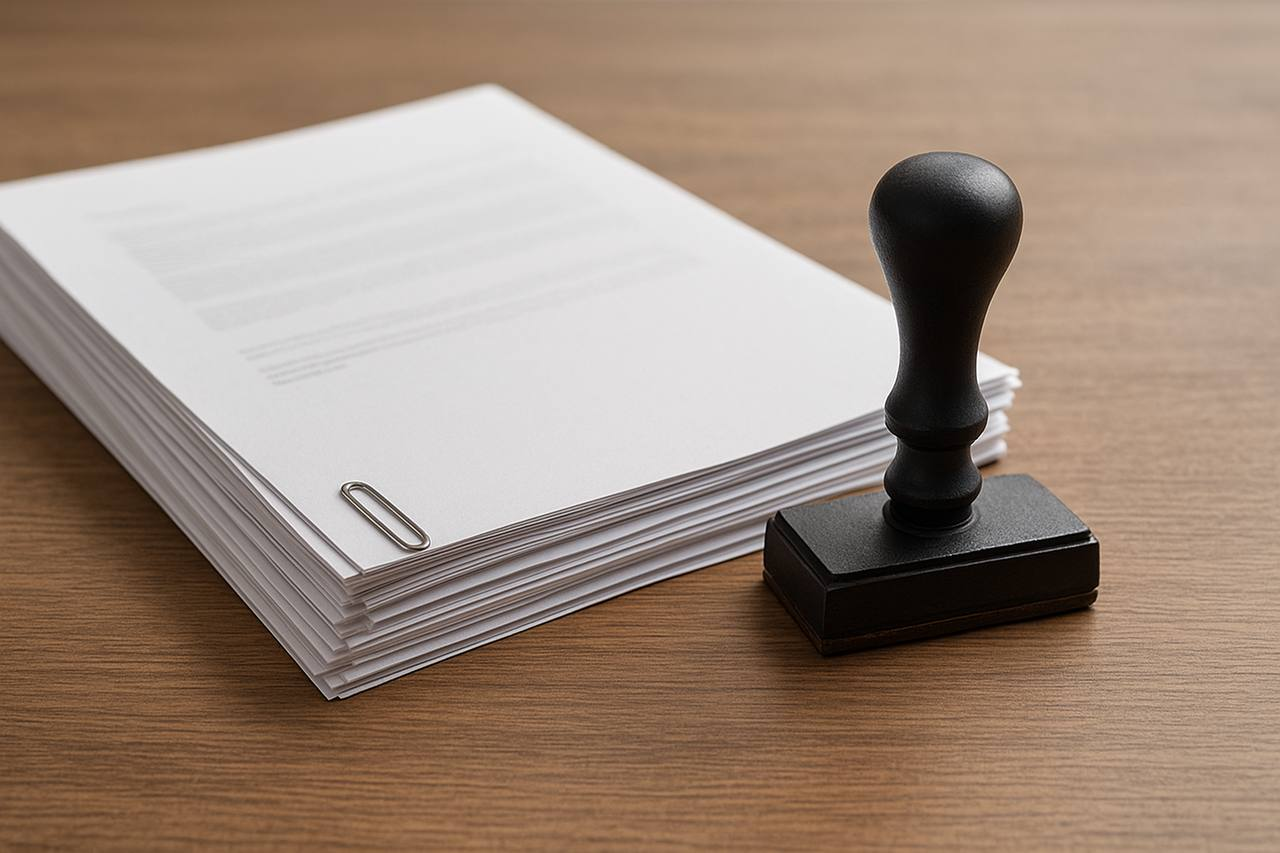

How to Verify Your Documents for Studying Abroad
Verifying your diploma, school certificate, or other education documents is a crucial step when applying to a foreign university. This process usually involves three key stages: legalization, translation, and recognition. In this guide, we’ll break down what each of these steps means, how they differ, and what mistakes students most often make — so you can avoid them.
Contents:
- Which documents need to be verified
- What the verification process includes
- Document legalization
- Document translation
- Document recognition
- Common mistakes applicants make
Which Documents Need to Be Verified
There’s no single, universal checklist — the requirements vary depending on the country and the university. However, most often you’ll need to verify:
- A diploma or secondary school certificate
- A transcript (grade list or “academic record”)
- Certificates (exam or language test results)
- Academic references or records
- Medical certificates
- Personal documents (passport, birth certificate, marriage/divorce certificate, etc.)
- Legal documents, powers of attorney, and other official papers
Always double-check the specific list of required documents on the official website of the university you’re applying to.
What the Verification Process Includes
Document verification usually involves three main stages:
- Legalization — confirming the document’s authenticity.
- Translation — into English and/or the language of your destination country.
- Recognition — confirming that your qualification meets the academic requirements abroad.
A common mistake applicants make is confusing legalization and recognition.
Legalization gives your documents legal validity in another country, while recognition confirms that your diploma or certificate is academically equivalent to the local standard required for university admission.
Let’s take a closer look at each stage.
Document Legalization
When applying to a university abroad, simply translating your documents isn’t enough — they must also be officially legalized. Without this step, the university has every right to reject your application.
Legalization confirms that your documents are genuine, issued by a competent authority, and that all signatures and seals are authentic.
There are two main types of document legalization:
- Apostille — a simplified form of legalization used in countries that are members of the Hague Convention. An apostille is a special stamp placed on original documents or notarized copies.
- Consular (full) legalization — required if the destination country is not a member of the Hague Convention. This process involves multiple stages of verification (through a notary, government agencies, and the consulate of the destination country). It usually takes longer — sometimes up to three months.
Always check whether legalization is required in your specific case. Typically, it’s needed for diplomas, certificates, transcripts, and official statements. However, documents like passports usually don’t require legalization.
Steps for legalizing your documents:
1. Find out which type of legalization you need — apostille or full consular legalization.
2. Prepare the original document (or a notarized copy).
3. Submit it to the relevant authority in your country:
— Apostilles are usually issued by the Department of Education, the Ministry of Justice, or other designated offices.
— For full legalization, you typically need to go through the Ministry of Foreign Affairs and then the consulate of the destination country.
4. Submit your documents and pay the fee.
5. Collect the legalized document with the stamp or apostille.
6. Double-check that the stamp is placed correctly, all pages are securely attached, and the text is clear and undamaged.
Document Translation
An official translation is the next essential step when preparing your documents for studying abroad. The university must be able to understand your diploma or school certificate — which subjects you studied, what grades you received, and other key details.
Note: In most cases, documents are translated after they’ve been legalized or apostilled. However, there are exceptions, so always check the specific requirements for your situation.
Main types of document translation:
- Professional translation — done by a qualified translator or translation agency. This option works if the university doesn’t require notarization. The key here is accuracy and proper formatting — the translator’s signature, stamps, and an exact match with the original. Unfortunately, small errors in terminology or layout are common in such translations, so make sure to proofread everything carefully.
- Notarized translation — the translator signs the document, and a notary verifies that the signature indeed belongs to that translator and that the translation is a true and complete copy of the original. This type is most often required when applying to public universities.
- Consular translation — some countries only accept translations certified by their consulate or by an official representative of the destination state. This option is less common but considered the most reliable and universally accepted.
How the translation process works:
- Prepare your original documents — diploma or school certificate, transcript, statements, and any other papers required by the university.
- Make copies of all necessary documents.
- Confirm the required language — usually English, but sometimes it must be the local language (for example, German, French, or Spanish).
- Check the requirements. If a notarized translation is needed, make sure your translator is authorized to work with a notary.
- Submit the documents to an accredited translation bureau or a certified translator.
- Assemble the final set: originals (or notarized copies) + translations. Most universities ask you to upload or send both the original-language version and the translation.
Key things to keep in mind:
- The translation must be accurate, with no omissions or mistakes — even small errors can cause your application to be rejected.
- Always double-check the requirements: in some countries, legalization comes before translation, in others — the opposite. Some universities require a consular translation, while others are fine with a professional one.
- Translations don’t usually expire, but if your document changes (for example, you receive an updated diploma or a new transcript), you’ll need to translate it again.
Recognition of Educational Documents
As a reminder, recognition means confirming the academic equivalence of your educational documents. Personal documents (like your passport or birth certificate) and general certificates (for example, a medical report) are not subject to academic evaluation.
Which documents require recognition:
- Diploma or school certificate — your main educational qualification.
- Transcript (grade report) — an official record of your subjects and grades.
- Course syllabi or program descriptions — required in case of course-by-course recognition.
Types of recognition:
- General (document-by-document) — the document as a whole is assessed to verify your education level, without analyzing individual courses or grades. This simplified form of evaluation is often used for immigration or employment purposes.
- Course-by-course recognition — a detailed analysis of your subjects, hours, and grades. The result is a full transcript with equivalent grades and converted credits. This type of recognition is typically required for academic admission to foreign universities.
Important notes:
- Keep both digital and paper copies of all your legalized and translated documents — most universities will check both versions.
- To save time, consider consulting professionals familiar with local requirements — for instance, Education Explorer experts can help you prepare and verify your documents correctly.
Common Mistakes Applicants Make
Mistake #1: Doing things in the wrong order
Applicants often translate their documents before legalization. However, most universities require the apostille or legalization stamp to be placed on the original (or on a notarized copy). So make sure to check the country and university requirements in advance. If you’re unsure, it’s best to ask an experienced admissions consultant for help.
Mistake #2: Translating documents yourself
Universities rarely accept self-translated documents. Most of them require a certified or notarized translation. Even minor terminology errors or formatting issues can lead to a rejected application.
Mistake #3: Translating only the diploma (without the transcript)
A diploma alone isn’t enough — universities need to see the subjects, hours, and grades you completed. Without the transcript translation, your qualification can’t be properly evaluated. Always translate the entire set: diploma/certificate and transcript/grade list.
Mistake #4: Submitting general recognition instead of course-by-course
For university admission abroad, you’ll most often need a course-by-course evaluation — a detailed recognition of your diploma or certificate plus your transcript. Check your target university’s website or contact the admissions office to confirm whether course descriptions or syllabi are required — and if so, be sure to translate and include them.
Assistance with Studying Abroad
The process of verifying your documents for a foreign university can be tricky — full of details and country-specific rules. That’s where we come in. Our team at Education Explorer is here to guide you through every step and help you get into the university of your dreams. A personal consultation with one of our experts is your chance to ask any questions you have and get clear, professional answers.
We’ll be happy to support you at every stage of your journey — from choosing the right university and preparing your documents to adapting to life in a new country.
You can book an online consultation in any convenient way:
— directly in your personal account,
— on the page of your chosen university,
— or by emailing us at support@ed-ex.com.
All About Education Abroad and Beyond


Not Just the Ivy League: Where Successful Entrepreneurs and Global Leaders Actually Studied


